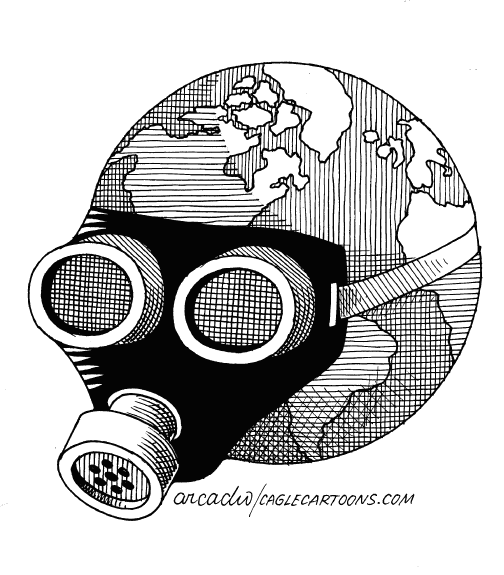Search
Democracy Links
Member's Off-site Blogs
trafigura .....

The British oil trader Trafigura has offered to pay out in a historic damages claim from 31,000 Africans injured by the dumping of toxic waste in one of the worst pollution disasters in recent history, the Guardian can reveal.
The compensation deal for the victims of toxic oil waste dumping in west Africa - likely to be confirmed imminently - means the full extent of attempts to cover up what really happened can be spelled out for the first time.
The truth is laid bare in Trafigura's hitherto secret documents, published by the Guardian today.
The company's internal emails show the true nature of the toxic waste dumped around Abidjan, the capital of Ivory Coast. Trafigura had publicly claimed the waste was harmless.
The exposure of the company files has contributed to Trafigura's climbdown after three years of bitterly contested legal battles. We are publishing them online today.
Martyn Day is a senior partner at the British law firm Leigh Day, which has brought one of the biggest group actions in legal history, seeking damages of £100m. He said today in Abidjan, where he has been negotiating the settlement: "The claimants are very pleased."
The traders have been publicly insisting for three years that their waste was routine and harmless. They claim it was "absolutely not dangerous".
They have until now denied the compensation claims, and their lawyers repeatedly threatened anyone worldwide who sought to contradict their version. They launched a libel case against BBC Newsnight, forced a "correction" from the Times, demanded the Guardian deleted articles, and yesterday tried to gag journalists in the Netherlands and Norway with legal threats.
But dozens of damning internal Trafigura emails have now come to light. They reveal how London-based company employers were told in advance that their planned chemical operation, a cheap and dirty process called "caustic washing", generated such dangerous wastes it was widely outlawed.
Trafigura's libel lawyers, Carter-Ruck, recently demanded the Guardian deleted published articles, saying it was "gravely defamatory" and "untrue" to say Trafigura's waste had been dumped cheaply and could have caused deaths and serious injuries. Both the Dutch paper Volkskrant and Norwegian TV said they were yesterday also threatened with gagging actions.
Trafigura launched a libel action against BBC Newsnight, complaining Trafigura had been wrongly accused of causing deaths, disfigurement and miscarriages, and had "suffered serious damage to their reputation".
The BBC filed a fighting defence this week, accusing Trafigura of knowing its chemicals were "highly toxic, potentially lethal and posed a serious risk to public health". The BBC also alleges a cover-up, saying Trafigura's denials "lack credibility and candour".
Newsnight plans to transmit another programme on the subject on BBC2 tonight.
The UN human rights special rapporteur Professor Okechukwu Ibeanu criticised Trafigura for potentially "stifling independent reporting and public criticism" in a report the oil traders tried and failed to prevent being published in Geneva this week.
The report said Ibeanu "views with great concern reports that the company has filed or threatened to file lawsuits against various civil society and media institutions that have reported ... in a critical manner".
http://www.guardian.co.uk/world/2009/sep/16/trafigura-oil-ivory-coast
meanwhile .....
The Guardian has been prevented from reporting parliamentary proceedings on legal grounds which appear to call into question privileges guaranteeing free speech established under the 1688 Bill of Rights.
Today's published Commons order papers contain a question to be answered by a minister later this week. The Guardian is prevented from identifying the MP who has asked the question, what the question is, which minister might answer it, or where the question is to be found.
The Guardian is also forbidden from telling its readers why the paper is prevented - for the first time in memory - from reporting parliament. Legal obstacles, which cannot be identified, involve proceedings, which cannot be mentioned, on behalf of a client who must remain secret.
The only fact the Guardian can report is that the case involves the London solicitors Carter-Ruck, who specialise in suing the media for clients, who include individuals or global corporations.
now the really interesting thing is that Carter-Ruck just happen to be the lawyers for Trafigura & are the same mob who succeeded in obtaining a gag order against the Independent for publishing the same story ..... but a copy of the Independent story (censored from the Independent's website) has been found on Google cache ....
http://88.80.16.63/leak/trafigura-toxic-waste-independent.pdf
This is the biggest toxic dumping scandal of the 21st century & it was originally exposed by the BBC Newsnight Program .....
http://news.bbc.co.uk/2/hi/programmes/newsnight/8048626.stm
and if you're interested, take a look at trafigura's track record on Wikipedia .....
- By John Richardson at 14 Oct 2009 - 10:15pm
- John Richardson's blog
- Login or register to post comments
Recent comments
8 hours 41 min ago
8 hours 57 min ago
10 hours 44 min ago
11 hours 27 min ago
16 hours 10 min ago
17 hours 27 min ago
18 hours 7 min ago
19 hours 4 min ago
1 day 4 hours ago
1 day 4 hours ago